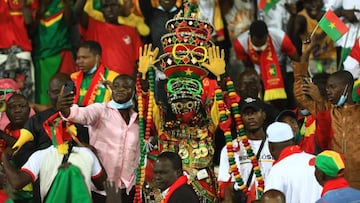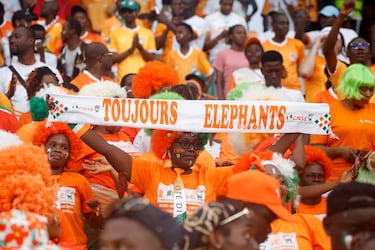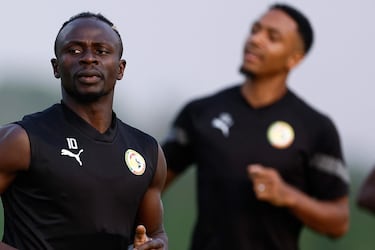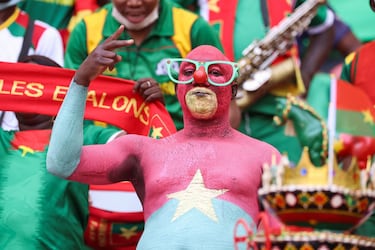What are the nicknames of every national team in the AFCON 2023?
From ‘Super Eagles’, ‘Copper Bullets’ and Blue Sharks’ through to hosts ‘The Elephants’, we break down the nickname of all 24 teams at AFCON.


The 2023 Africa Cup of Nations got underway on Friday (12 January) as hosts Ivory Coast saw off Guinea Bissau with a 2-0 win.
24 sides eye the biggest prize in African football with the final scheduled for 11 February where the champion of Africa will be crowned at the 60,000 capacity Alassane Ouattara Stadium in the capital, Abidjan.
Qui aura le trophée 🏆 cette année ?#TotalEnergiesAFCON2023 #CAN2023 #AFCON2023 pic.twitter.com/OOAzNWQGtz
— proivoiriens.net | #TotalEnergiesAFCON2023 (@LesProIvoiriens) January 12, 2024
As always each of the participants will be supported by small groups of travelling fans with the cultural heritage and national colours forming a key element in the supporters match-day attire. Every bit as important to fans are the national team nicknames which are often laden with cultural, historical and emotional meanings, reflecting the hopes and spirit of the 24 participating nations.
AFCON 2023: team nicknames by group
Group A:
Ivory Coast: The Elephants
The ivory tusks on the largest mammal give it a graceful yet conquering demeanor that sets it apart. Côte d’Ivoire used to be one of the biggest exporters of ivory given the large population of African elephants.
Their national football team has since embraced this name – the Elephants with so much pride and carried the spirit of the elephant to every tournament.

Nigeria: Super Eagles
The eagle which adorns the national team badge illustrates pride and power along with symbolizing the superiority, bravery, courage and high ambition of the national team. It makes them exhibit a never-give-up attitude and a posture that is always unique.
🇳🇬 Osimhen in the qualifying campaign :
— AFCON 2023 News (@afcon2023news) January 14, 2024
🔰 6 matches played
⚽️ 10 goals
🅰️ 2 assists#AFCON2024#TotalEnergiesAFCON2023 pic.twitter.com/hTQuKbphu3
Equatorial Guinea: Nzalang Nacional
The ‘national ray of light in Fang’ or ‘national thunder’ is meant to evoke fear into opponents as they make their fourh ever appearance at an Africa Cup of Nations tournament.
Guinea-Bissau: Djurtus
Djurtus means an African wild dog in the Portuguese-influenced Creole spoken by the majority of citizens with the animal considered to be the largest wild canine on the continent.
AOS ⚽
— Nó Tchon 🇬🇼 (@NotchonGB) March 30, 2021
AFCON 2021 Deciding game, we win, we qualify ✅
Guinea-Bissau 🇬🇼 v Congo 🇨🇬
🕕: 16:00 GMT
🏟️: Estádio Nacional 24 Setembro, Bissau
📸: Sou Djurtu pic.twitter.com/uvuLzcYRB5
Group B
Egypt: The Pharaohs
The Pharaohs who, as leaders, were mediators between the gods and Egyptians in ancient history. In celebration of this rich heritage, Egypt, as the Pharaohs, represents royalty and excellence in true reflection of the original meaning of the word – a high place or a palace.
The show is about to begin 👀🇪🇬#egyptnt pic.twitter.com/Bgc2MngLAH
— Egypt National Team (@EgyptNT_EN) January 14, 2024
Ghana: Black Stars
The Black Stars of Ghana are named after Marcus Garvey’s Black Star Line shipping line that spearheaded the Back-to-Africa Movement in the 20th century to advocate for the return of the descendants of African American slaves to Africa.
The Black Star, which sits in the middle of the Ghanaian flag, represents freedom, African pride, Black sufficiency, and the Pan African Movement.
Cape Verde: Blue Sharks
The island nation surrounded by shark infested waters offers rivals a reminder that Cape Verde is not just about the scenic beaches. The Cape Verde Blue Sharks, like the ones at sea, are quick on their feet, can exploit counter-attacks, and work well as a team.
Good to see Rayo's main man Bebe in action for @fcfcomunica tonight with the Blue Sharks leading Ghana and Bebe playing as centre forward.#GHACPV #AFCON2023 pic.twitter.com/KWi5ee2HMg
— Paul Reidy (@paulreidy67) January 14, 2024
Mozambique: Os Mambas
The Mamba refers to the venomous snake, symbolizing the speed, agility and danger that the Mozambique team poses to their opponents.
Group C
Senegal: Lions of Teranga
Known for vast plains, Senegal has an abundant stretch of woodland savannah and large regions of land with wooded wetlands that provide the perfect environment for lions.
The Lions of Teranga tag then encompasses the kings of the jungle in this precious land of Teranga – a Wolof word to mean hospitality. Senegalese people are very warm and gracious in everything that they do.

Cameroon: Indomitable Lions
The ones who cannot be tamed are called indomitable. With an impressive five CAF AFCON trophies in their cabinet, it is very easy to understand and see why Cameroon is called the Indomitable Lions. A team impossible to tame or defeat!
Guinea: Syli National
Translated to national elephants from the local Sousou language, the Sylis represent majesty and wisdom. Guinea, who were finalists back in 1976, have always been in and out of the high echelons of African Football but can never be ignored. The Syli was also used to be Guinea’s currency between 1971 and 1985.
The Gambia: Scorpions
The scorpion symbolises strong defence and stinging attack, reflecting the team’s tactics and spirit as the Gambia side look to sting their opponents with agility and precision.
The Scorpions have landed safely in Yamoussoukro.
— Kerr Fatou (@Kerrfatou) January 11, 2024
Photo Credit: Gambia Football Federation pic.twitter.com/ADaMZtDJaw
Group D
Algeria: Les Fennecs / Desert Foxes
The fennec is is the national animal of Algeria. The desert foxes are the smallest foxes in the world and can be found in the Sahara Desert in Algeria. Very intelligent, shy, and highly intuitive, the foxes use these qualities to survive in their environment.
Burkina Faso: The Stallions
Depicted on the coat of arms of Burkina Faso, the two stallions are a celebration of the legendary Princess Yennenga considered to be the mother of the Mossi People who are the largest ethnic population in the country. The national team encompass resilience and resolve to continuously keep their name on the high table of African Football.

Mauritania: Lions of Chinguetti
Chinguetti is a fortified village located in the famous Adrar region in the north of Mauritania. Named as a UNESCO World Heritage Site for having the second oldest minaret in consistent use in the Muslim world, Chinguetti is considered a national symbol.
Angola: Palancas Negras
The sable antelope is the national icon of Angola. It can be seen on money notes, stamps, and logos in many a firm and company over the years. The sable antelope symbolizes beauty, grace, and keen visual sharpness.
#TotalEnergiesAFCON2023🇨🇮
— PALANCAS NEGRAS 🇦🇴 (@_PalancasNegras) January 13, 2024
Nous demandons à tous d’encourager les Palancas Negras et de croire en eux.
Les joueurs ont besoin de sentir le soutien du peuple.
Rendez-vous 𝗹𝘂𝗻𝗱𝗶 𝘀𝗼𝗶𝗿 pour le début de compétition face à l’Algérie. 🇩🇿#ForçaPalancas | #ForçaAngola 🇦🇴 pic.twitter.com/R8eiiCvfLs
Group E
Tunisia: Carthage Eagles
Located to the north of capital Tunis, Carthage is known for its archaeological sites in Tunis founded by the Phoenicians in the first millennium BC. At some point, it was the richest city in the Mediterranean Region. As a tribute to this rich past, Tunisia combines it with the ferocious power of an eagle that sets out to showcase its freedom and majesty.
🇹🇳 Kappa have crafted another beauty to give Tunisia a top-end wardrobe going into the African Cup of Nations!
— The Kitsman (@The_Kitsman) January 13, 2024
As if the home and away weren’t clean enough, this third kit changes it up slightly with the inclusion of a mosaic inspired pattern paying homage to the world heritage… pic.twitter.com/Oolr7jc7O9
Mali: Eagles
Combined with the unique qualities of the strong-eyed birds, Les Aigles represent a force to reckon with in African football with the eagle featuring on Mali’s national team jerseys.
South Africa: Bafana Bafana
Named by local journalist S’busiso Mseleku back in 1992 after re-admission into international football circles, Bafana Bafana is a Zulu term to mean ‘boys boys or lads, lads ’. It is a stimulus to further motivate and induce aspiration in the players to go further and beyond.
Flying the flag high! We took the liberty to feel the weight of the flag… We don’t take playing for our country and our people for granted! We here to compete! #TotalEnergiesAFCON2023 #AFCON2023 #BafanaPride pic.twitter.com/P2FcY2p8Ay
— Bafana Bafana (@BafanaBafana) January 14, 2024
Namibia: Brave Warriors
Namibia is home to the oldest desert in the world and the second-largest canyon in the world. To survive here, you need to be a brave warrior. The label given to the national football team carries the spirit of a nation to survive amidst whatever environment.
Group F
Morocco: Atlas Lions
One of Morocco’s main tourist attractions, the Atlas Mountains stand tallest. Stunning in stature, this was home to the wild atlas lions before they went extinct. However, their legacy continues within the national football team that remains inspired through the rafters and into eternity. In sheer lion style, Morocco has produced some of the best talent to ever play the game on the continent.
يواصل منتخبنا الوطني تحضيراته لنهائيات كأس أمم إفريقيا كوت ديفوار 2023 🇨🇮
— Équipe du Maroc (@EnMaroc) January 10, 2024
Our National Team continues its preparations for the TotalEnergies CAF Africa Cup of Nations, Cote d'Ivoire 2023#DimaMaghrib 🇲🇦 pic.twitter.com/BKdEdUorHl
DR Congo: The Leopards
The DR Congo national side have seen a change in their nickname over the years. First, they were Leopards then they switched to Simbas (lions in Swahili) then back to Leopards. Very central to the coat of the arms of the Democratic Republic of Congo, the leopard represents the strength and resilience of her people.
Zambia: Copper Bullets
The Chipolopolo were named after the country’s biggest export with Zambia being one of the world’s leading copper producers and as a way of showcasing a fearsome tactic against opponents, the term ‘bullets’ was adopted.
THE HOUR HAS COME! 📸 Look at this post on Facebook https://t.co/KNkcd5Wh18 pic.twitter.com/Du4WHDCxyw
— FAZ (@FAZFootball) January 15, 2024
Tanzania: Taifa Stars
Related stories

Onana still at United despite AFCON start
Taifa is a Swahili word that means nation. The Taifa Stars of Tanzania bring together the crème de la crème players from both the mainland (formerly known as Tanganyika) and the Zanzibar Island with the Taifa Stars bringing together this great footballing nation.
For a full fixture list, check out our handy guide to AFCON 2023.
